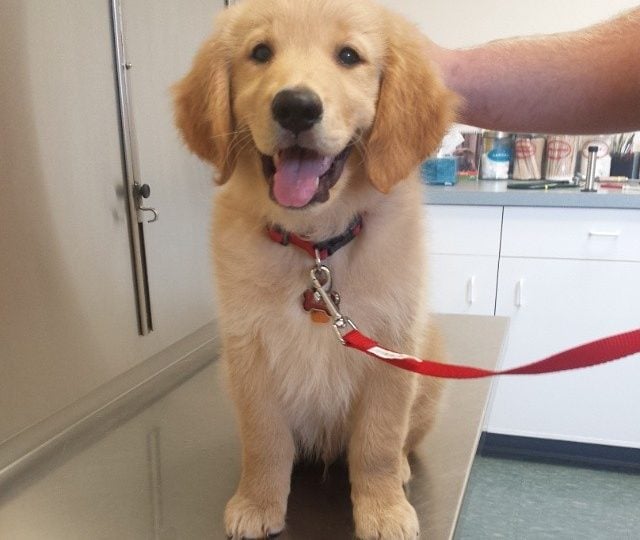- Not a substitute for professional veterinary help.
It takes a team to raise a puppy right and a good vet is one of the most important players. On your first visit, your vet can help you get a complete picture of your puppy’s health and offer advice on what to expect over the coming months and years. Whether this is your first puppy or your third, these are the first questions to ask your vet.
1. Is my puppy healthy?
Even pups who appear bright-eyed and bushy-tailed can be carrying parasites or concealing another illness beneath the surface. In your first wellness check, your vet should evaluate your puppy for any gastrointestinal, respiratory or skin issues. A fecal test can help to identify any parasites they’ve picked up in their first weeks.
2. How many times a day should I feed my puppy?
Most puppies need to eat more frequently than older dogs. Find out how many meals a day your vet recommends and get more bang for your buck by feeding out of interactive puzzle toys. Reserve some of your pup’s daily meals to use to reward and encourage desirable behaviors.
3. What type of food is best for a puppy?
Puppies typically require a different balance of nutrients than older dogs, including higher levels of protein, fat and calories. Providing proper nutrition early on can help your pup to avoid rapid weight gain, skin problems and other health issues.Talk to your vet about what brands or styles of food—kibble, dehydrated foods, canned food, raw food, home-cooked meals—they recommend for a growing pup.
4. How often should my puppy visit the vet?
Puppies go through so many physical and behavioral changes in their first six months they require more frequent veterinary check-ins than older dogs. Some vets like to monitor a pup during monthly wellness checks. Others may recommend visiting every two to three months completing their basic vaccinations.
5. When should I spay/neuter my puppy?
Spaying or neutering can be done at almost any age but waiting to do the procedure until your dog is a bit older may have some advantages for certain breeds. Discuss with your vet what the right option for your pup is, given their size, age and genetics.
6. When can I begin to walk my puppy outside?
In order to protect against diseases like distemper, parvo and parainfluenza, puppies require four sets of vaccinations. But most trainers and behaviorists agree that the vast majority of puppies don’t need to wait until they are 100% vaccinated to begin to walk outside, as long as certain precautions are taken (including sticking to the pavement, avoiding grass, and keeping away from dog poop and unfamiliar dogs). Talk to your vet about what stage in their vaccination schedule it’s safe for your pup to hit the road.

via flickr/bullcitydogs
7. What kind of parasite protection does my puppy need and how often should I give it to them?
Keeping your dog safe from fleas, ticks and heartworms is a lifelong battle that begins in puppyhood. Discuss with your vet about the parasites that are most prevalent in your area and the treatments they prefer for puppies.
8. How do I care for my puppy’s teeth?
Oral care is an important part of maintaining your puppy’s overall health as they grow. Talk to your vet about the best way to introduce your pup to toothpaste and a toothbrush, as well as other supplements such as dental treats and water additives that will help keep their teeth healthy and strong.
9. Do you have a list of recommended classes and private trainers?
Puppyhood is the ideal time to begin working on basic cues and improving behaviors like nipping and accidents. Most vets can provide recommendations for reputable local businesses that offer group training classes or one-on-one private training. It’s crucial for all dogs, especially puppies, to work with a trainer who uses positive-reinforcement or rewards-based methods based in science. Avoid any trainer or class that discusses dominance or “balanced” training methods in their promotional materials.
10. Should I get pet insurance?
Pet insurance can help keep vet bills manageable, and a dog’s puppyhood is often the best time to get it. That’s because at birth, most dogs don’t have any pre-existing conditions, which can keep them from being covered in later life. It’s a good time to find out if your vet recommends any specific insurance providers for your dog’s particular breed and health outlook.
On the fence? Read up on how pet insurance works and how to know if it’s a good deal for you.





